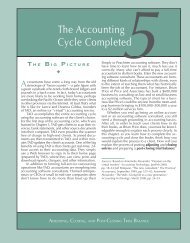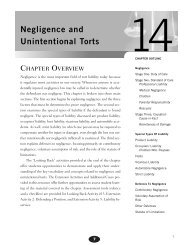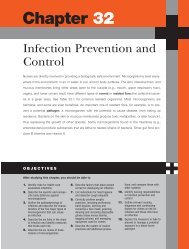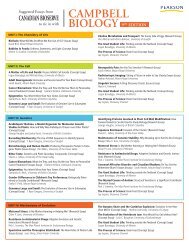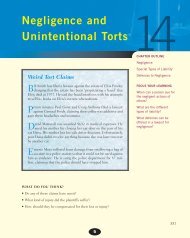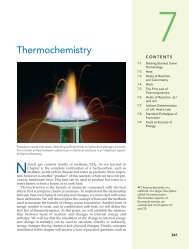PART Introduction to Cultural Anthropology - Pearson Canada
PART Introduction to Cultural Anthropology - Pearson Canada
PART Introduction to Cultural Anthropology - Pearson Canada
Create successful ePaper yourself
Turn your PDF publications into a flip-book with our unique Google optimized e-Paper software.
In India, a white sari (women’s garment) symbolizes<br />
widowhood. To these women, the Western cus<strong>to</strong>m of<br />
a bride wearing white would seem inauspicious. ■<br />
(Source: Barbara Miller)<br />
Thus, studying only one or two aspects of culture<br />
provides understanding so limited that it is more likely <strong>to</strong><br />
be misleading or wrong than more comprehensively<br />
grounded approaches.<br />
Consider what would happen if a researcher were <strong>to</strong><br />
study intertribal warfare in Papua New Guinea (see<br />
Map 1.4) and focused only on the actual practice of<br />
warfare without examining other aspects of culture. A key<br />
feature of highland New Guinea culture is the exchange<br />
of pigs at political feasts. To become a political leader, a<br />
man must acquire many pigs. Pigs eat yams, which men<br />
grow, but pigs are cared for by women. This division of<br />
labour means that a man with more than one wife will be<br />
able <strong>to</strong> produce more pigs and rise politically by giving<br />
more feasts. Such feasting enhances an aspiring leader’s<br />
status and makes his guests indebted <strong>to</strong> him. With more<br />
followers attracted through feasting, a leader can gather<br />
forces and wage war on neighbouring villages. Success in<br />
war brings gains in terri<strong>to</strong>ry. So far, this example focuses<br />
mainly on economics, politics, and marriage systems. But<br />
other aspects of culture are involved, <strong>to</strong>o. Supernatural<br />
powers affect the success of warfare. Painting spears and<br />
shields with particular designs helps increase their power.<br />
At feasts and marriages, body decoration, including paint,<br />
shell ornaments, and elaborate feather headdresses, is an<br />
important expression of identity and status. Looking at<br />
warfare without attention <strong>to</strong> its wider cultural context<br />
yields an extremely narrow view.<br />
The fact of cultural integration is also relevant <strong>to</strong><br />
applied anthropologists who are involved in analyzing<br />
cultural change. Attempting <strong>to</strong> introduce change in one<br />
aspect of culture without giving attention <strong>to</strong> what its<br />
effects will be in other areas is irresponsible and may<br />
even be detrimental <strong>to</strong> the survival of a culture. For<br />
MAP 1.4 Papua New<br />
Guinea. The Independent<br />
State of Papua<br />
New Guinea gained its<br />
au<strong>to</strong>nomy from<br />
Australia in 1975.<br />
Mostly mountainous<br />
with coastal lowlands,<br />
PNG is richly endowed<br />
with gold, copper, silver,<br />
natural gas, timber,<br />
oil, and fisheries. Its<br />
population is around<br />
5 700 000. Port<br />
Moresby, the capital,<br />
has a high rate of<br />
HIV/AIDS infection<br />
among the working-age<br />
population.<br />
INDONESIA<br />
Ok Tedi R.<br />
Fly R.<br />
Sepik R.<br />
Ok Tedi Mine<br />
PAPUA<br />
NEW GUINEA<br />
Torres Strait<br />
AUSTRALIA<br />
Mt. Hagen<br />
Gulf of<br />
Papua<br />
Port<br />
Moresby<br />
Huon<br />
Gulf<br />
Trobriand<br />
Islands<br />
Coral Sea<br />
New Britain<br />
Goodenough<br />
Island<br />
SOLOMON<br />
ISLANDS<br />
0 100 200 Miles<br />
0 100 200 Kilometres<br />
globalization: increased and intensified<br />
international ties related <strong>to</strong> the spread of<br />
Western, especially United States, capitalism<br />
that affects all world cultures.<br />
localization: the transformation of global<br />
culture by local cultures in<strong>to</strong> something new.<br />
class: a way of categorizing people on the<br />
basis of their economic position in society,<br />
usually measured in terms of income or<br />
wealth.<br />
18 <strong>PART</strong> I ■ <strong>Introduction</strong> <strong>to</strong> <strong>Cultural</strong> <strong>Anthropology</strong>



